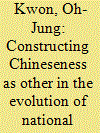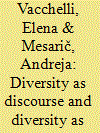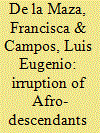| Srl | Item |
| 1 |
ID:
179527


|
|
|
|
|
| Summary/Abstract |
This study traces the way the evolving nature of the Korean national identity has shaped the construction of the Chineseness of immigrants as others. Two immigrant groups, Chinese immigrants called Hwagyo and Korean-Chinese referred to as Joseonjok, have constituted the majority of foreigners in Korea during different historical eras. Although Koreans assumed both represented ‘Chinese’ people, I argue that the core of their Chineseness was defined differently according to the evolving sense of the Korean subjectivity. The growth of the national economy and the culturally advanced and orderly society constituted the sources of the national character and provided legitimate grounds to discriminate against Chinese immigrants who were assumed to pose economic and cultural threats. This study suggests that the different logic of ‘othering’ is derived from the evolution of the Korean national identity in response to the nation’s changing economic and political circumstances.
|
|
|
|
|
|
|
|
|
|
|
|
|
|
|
|
| 2 |
ID:
179525


|
|
|
|
|
| Summary/Abstract |
The paper critically examines the way diversity is conceptualised as a dominant discourse and as a paradigm for understanding the present, which has gradually replaced multiculturalism in academic and policy discourse. Using our interviews with third sector practitioners providing mental health support to a wealth of migrant populations in London, the paper offers key examples of how TSOs (Third Sector Organisations) address migrant women’s diverse needs, showing how diversity is practised in the everyday of community groups. This paper’s novelty consists in exposing overlaps and divergences between diversity discourses and diversity practices and its added value lays in the combination of academic and practitioner perspectives in the study of TSOs supporting migrant, refugee and asylum seeker women in London.
|
|
|
|
|
|
|
|
|
|
|
|
|
|
|
|
| 3 |
ID:
179528


|
|
|
|
|
| Summary/Abstract |
Characteristics from the social construction of ‘self’ and of ‘others’ in Bosnia-Herzegovina show that the creation of a positive self-image in this post-war society is strongly connected with collective self-victimisation of one’s own in-group. An objective hermeneutical analysis of narrative interviews conducted with Bosniaks, Bosnian Croats, and Bosnian Serbs reveals five self-victimisation strategies: Two dissociative strategies, which conspicuously reproduce the dichotomy of victim and perpetrator along ethnic lines and candidly reinforce the ethnic boundaries – moral alchemy and double relativisation – and three strategies, which seem to transcend the boundaries between ethnic in-group and out-group – the associative strategies of subjectification of war, the externalisation of responsibility, and silence. A subsequent contextualisation of the identified strategies indicates, however, that, ultimately, associative strategies are equally conducive to the further manifestation of ethnic boundaries.
|
|
|
|
|
|
|
|
|
|
|
|
|
|
|
|
| 4 |
ID:
179526


|
|
|
|
|
| Summary/Abstract |
This paper analyses the irruption of Afro-descendants in the sphere of local and national public policies as aresult of their demand for political recognition. Starting in 2000, an Afro-descendant movement developed, positioning itself locally and nationally and obtaining political recognition in 2019 under Law N° 21.151. Incorporating a‘new diversity’ in the design and implementation of public policies as distinct from the indigenous policies that had been implemented for more than 25 years. The paper analyses different levels of state action, relations with other diversities in the implementation of targeted policies (particularly indigenous policies) and the process of Afro-descendant recognition itself. This case shows the difficulties in broadening the social and state vision of cultural diversity and how these are reflected in disputes about the legitimacy of being the ‘original’ peoples as well as for spaces of power and state resources.
|
|
|
|
|
|
|
|
|
|
|
|
|
|
|
|
| 5 |
ID:
179524


|
|
|
|
|
| Summary/Abstract |
This study investigated the image of the Naga Indigenous people in mainland India and how the Nagas endeavour to develop an alternative image. Findings revealed that the mainland Indians’ image of the Nagas is that of ‘noble savage’ which is similar to the Indian Government’s representation of the Nagas as exotic and untamed. The Nagas expressed cultural resistance and articulated radical Naga discourse through their religion (Christianity) to enhance collective identity but most importantly to oppose the dominant Hindu and Muslim religions in mainland India. However, the resistance of the Nagas drew on Bhabha’s concept of hybridity in which the Nagas re-negotiate their identity – with complex mimicry and façade – traits about ‘Hindu-Muslim India’ that they admire and certain cultural aspects they ridicule and would rather not imbibe. This study contributes to the current anthropological discourse towards studying indigeneity by making a more complex, nuanced analysis of resistance.
|
|
|
|
|
|
|
|
|
|
|
|
|
|
|
|